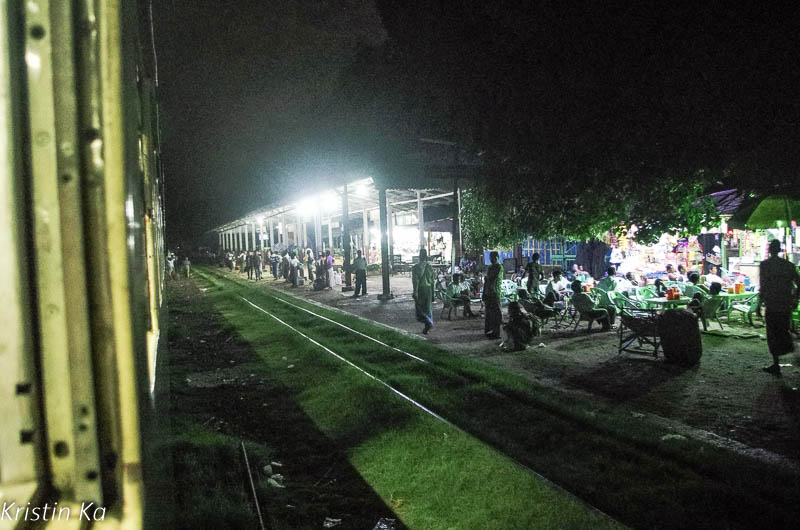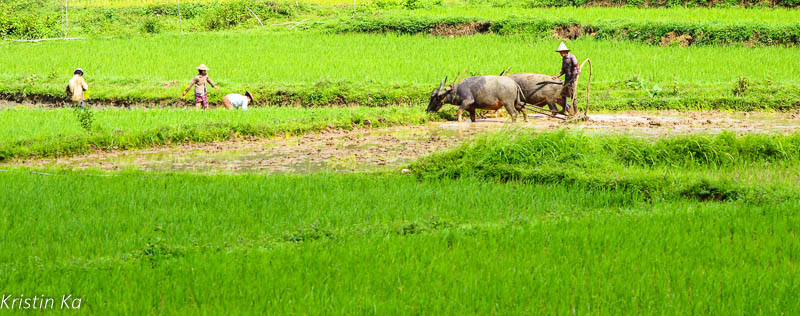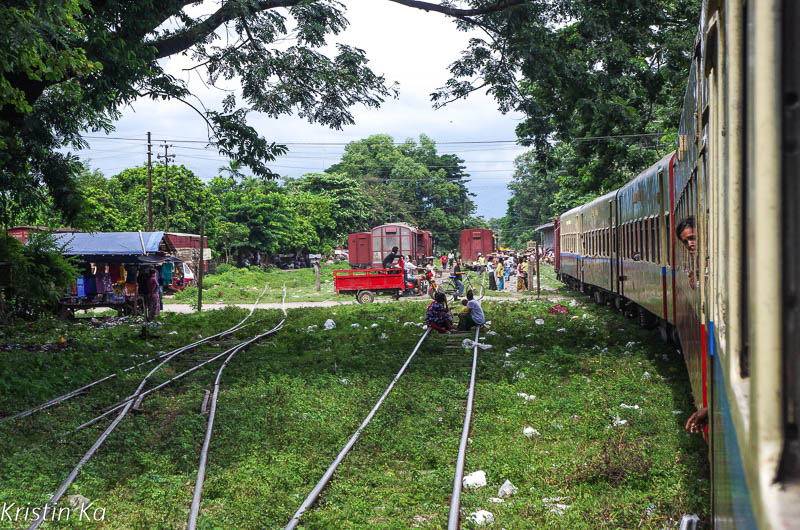The train is an ideal means of locomotion to discover a country. Usually the journey takes a long time, which gives the opportunity to enjoy the landscape. In a train, unlike a bus, you can move around, move from wagon to wagon and get to know other travellers.
This train from Burma, leaving Mandalay to arrive in the North took more than 15 hours. An old gas micheline pulled innumerable wagons loaded to the maximum. In movement, every second is a jolt and one is constantly jumping on the stoned seats of the first class.
No bar, toilets with a hole and no water, no air conditioning, no mains, no electrical outlet… and no timetables.
A very nice gentleman at the ticket office is in charge of giving me all the information on the way to Nabar, heading north.
He consults innumerable large handwritten notebooks and goes back and forth several times to other desks.
Tellers and checkers sit on large stools, smoke cigars and chew betel, whose blood-red juice they regularly spit into a large cup. they smile at me in a strange bloody grimace.
My informant is very proud to look after me. Everyone comes to see the farang (stranger) in his office as a curiosity. He gently chases them away.
I choose to leave at the end of the afternoon, next day. It’s a ten to eleven hour journey, he said. I will arrive around six o’clock in the morning, which is perfect.
I have to pay in dollars because I am a foreigner. In Burma it’s the rule. Even if I have kyats, I have to pay in dollars.
The tellers chief makes the note, everything is handwritten, with my passport number and I can barely write my name in the Latin alphabet.
He informs me that this is not a night train and hastens to offer me first class. At thirteen dollars a ticket, I don’t quibble, I have to be able to lie down in my seat.
Let’s go for a great trip.
Bag on my back, the next day at the appointed time, I arrive at the station
Another nice man who filters the access to the platform takes my precious ticket, barely masks his surprise and leads me to the train.
Luckily I have a first class ticket.
It’s a big wagon with all the windows open, the seats are black with dirt, they haven’t seen any washing powder for forty years.
The ceiling is covered with flies, red dragonflies hanging like bats, and spiders. Not the fragile mowers of our regions, no, they are big and fat, not shy at all. They have all the time to bite the dragonflies that have the clumsiness to get caught in their web, yes, I have witnessed the crime live. They have a rent for life here. They are sure not to be disturbed by a zealous duster.
My seat is occupied by Burmese people who are being chased away by the controller. I settle down.
Pssst, Pssst! A myriad of saleswomen, trays full of food on their heads, call me through the window. They are very discreet, attract my attention with kisses noise and muffled hoo-hoos. Strange.
I ask for fruit. They run to get the goods like heroin dealers.
I pay just in time before I see them running away like a herd of antelope sensing the lion coming: a controller arrives.
In Mandalay, vendors are forbidden on the quay, you have to go to the shops. It was indeed strange that they didn’t stand on the platform, but on the other side of the train, on the rails. They leave laughing, the ticket inspector chases them away like thieving birds, without malice.
In this train, I am a stranger under high surveillance
As I am waiting to leave, I see a man in uniform coming to the window, very out of breath and dripping with sweat.
He introduces himself to me in very approximate English. I shake his hand and introduce myself with a smile. The ticket inspector warned him that there was a stranger on board and this man is the train policeman. Still holding my hand in his, he explains that he will look after my safety and that I must come to him if there is any problem. He is touchingly sincere. I thank him but I will not need his services, on board this train, everyone will look after me.
The train starts and it looks like a rocket take-off
the sheet metal cries, the wheels howl, the wagon creaks and everything begins to tremble under an avalanche of jolts and jumps.
The armchairs are completely smashed, seat and backrest are almost all dislocated. In fact, mine is no longer able to stand up under the weight of years and is yo-yoing with every swerve. And I’m not going to miss any swerve.
But, actualy, it’s not a train, it’s a boat on rails.
A supertanker sailing in the middle of an ocean of rice paddies, in the thick night, in the air fogged with the golden dust of the setting sun, in the whiteness of the dawn, in the dense thickets whose tenacious branches come in through the windows. Pushy, stiff, dislocated, full of holes, noisy, but stubborn in effort, bravely pulling its freight from sacks of rice, watermelons, flour, women and children loaded like donkeys.
We gait violently from right to left or when we take the waves head-on we jump on our seats like on a trampoline.
I see the other wagons rocking so hard that I wonder how they don’t come loose.
In this train there are windows that don’t close. Anyway it is so hot and sticky that I feel like covered in jam.
They will remain open throughout the journey, sometimes with a small fan reinforcement hanging from the ceiling.
At each stop, vendors get on the train. They offer rice in polystyrene trays, lots of stuff in bags, fresh drinks. They pass by again and again, then get off at one station and take the next train in the other direction.
Everyone sleeps across seats, feet through the window, some direct on the floor.
In this train are extraordinary travelling companions
Here, there is no need to hold on to your bag for fear of theft. All my travelling companions know who I am and some even come from the other carriages to see me. They wish me a safe journey and ask if I don’t lack anything.
While I am completely lost in the itinerary, I can’t read the names in Burmese of the stations, I can’t find my way around the schedule, I rely on the other travellers.
All along this 18 hour journey, the controllers will come one after the other to come and greet me. Under cover of checking my ticket, they come to shake my hand or introduce proudly themselves. They take a lot of time to examine it, very seriously, reading and rereading my name. Each time they bow with a “thank you miss Christine” or “welcome“. They are not at all interested in my ticket, they already know that I travel in good standing.
The other passengers in the compartment also know where I’m going, that I’m French. Each in turn, they greet me, inform me about the bus to take, the boat, the hotel, one of them even offers to welcome me at home.
They take picture of me. Discreetly, when I fall asleep.
When I want to buy some fruit for two hundred kyats, because I don’t have any change, I hold out a five thousand kyat note. The saleswoman doesn’t have the change. The ticket checker who monitors the transaction in case I am charged more hastens to pay for me with his hand on heart.
No other strangers on board the train. Few tourists choose this mode of transport, besides, very few of them, apart from humanitarians, go to the north. It’s far away, noisy, uncomfortable, the hours of travel are counted in the day. They rather make tourist tours, visit temples, beaches, the Inlé Lake.
The train stops all the time. Mostly at stations but also in the middle of nowhere and nobody knows why
When I go down on the quay to smoke a cigarette, the Burmese crowd around me, sometimes they chat, sometimes they wave at me, puff happily when I answer them in burmese or say nothing at all and observe.
Sometimes you have to wait for another train to pass. A signalman is standing ready for the manoeuvre, I see his dark silhouette in the middle of the tracks, lost in the darkness, an iron bar in his hand.
In the middle of the night, when almost everyone is asleep, I take out my camera and go for a visit in the other wagons.
Luckily I chose the first one. The standard of the second class is more like a cattle van than a passenger car. Wooden benches, disjointed flooring, no ventilators. Totally dilapidated.
In Burma, everything is used to the end. Buses have nothing to envy to trains. They are repaired until rust eats away at them and they can no longer stand upright. They end their life of toil at the roadside, slowly rotting in the rain and scorching sun.
Stations teeming with life, 24 hours a day, 7 days a week, bustling to the rhythm of the trains
At each station, when the train stops, there is excitement. Saleswomen come out of the station, with a tray on their heads, walk along the platform, enter the carriages and haranguing the passengers with a nice Burmese melody which, I suppose, is similar to our “ice cream, ice cream!” of beach vendors.
Some of them put candles on the tray in the middle of the victuals. They pass by, back and forth during the whole time of the stop. And it lasts… Here there is no stress for fear of missing the descent.
The men, tightly packed in their longyi, a kind of skirt, come out in tens loaded with bags weighing on their shoulders like dead horses. They run in small steps, bending under the burden. Loading and unloading the train, again and again.
I see their laborious dance under the pale neon lights of the station. When the train is full again, they huddle together blowing, dragging their feet, towards the tables, the benches, smoking cigars, lying down where they can and falling asleep as fast as they can, until the next train.
It is three o’clock in the morning in this station with an illegible, unpronounceable name. Everything is in turmoil. Fires are lit, placed on the ground, large pots of food are smoking, the women are sitting in groups, cutting fruit, cooking, discussing. Only the children sleep, almost naked, lying on mats on the floor, in the middle of everyone.


